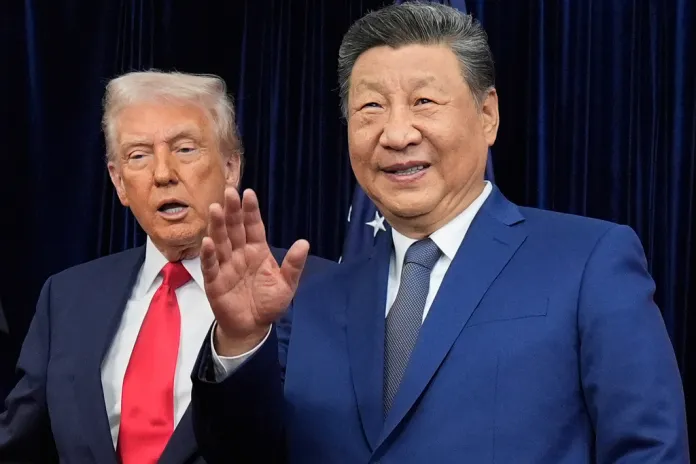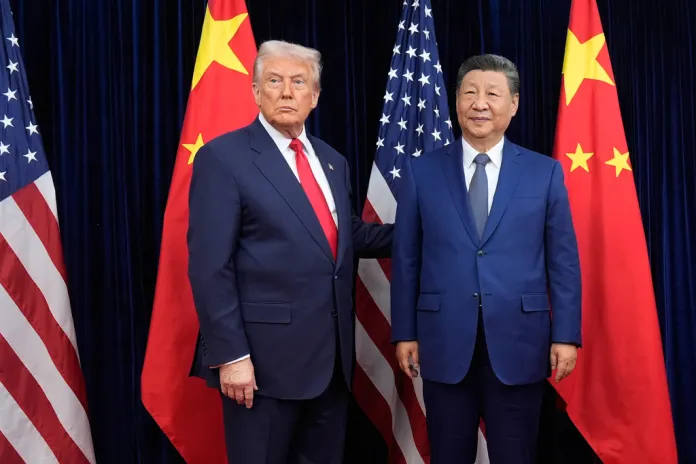President Donald Trump and Chinese paramount leader Xi Jinping seem to be embracing a water-under-the-bridge mentality following their trade summit in South Korea.
Despite speculation that the summit could prove to be a tense confrontation between the two world leaders — their first time meeting in person since Trump returned to office — the United States and China have agreed that friendship is preferable.
“Given our different national conditions, we do not always see eye-to-eye with each other and it is normal for the two leading economies of the world to have frictions now and then,” Xi said of the meeting, according to the Ministry of Foreign Affairs.

The paramount leader continued: “In the face of winds, waves and challenges, we should stay the right course, navigate through the complex landscape, and ensure the steady sailing forward of the giant ship of China-U.S. relations. I am ready to continue working with you [Trump] to build a solid foundation for China-U.S. relations and create a sound atmosphere for the development of both countries.”
A former senior U.S. diplomat with extensive experience in China told the Washington Examiner that Beijing seems to be characterizing this meeting as a “step along the way” to more equal, beneficial arrangement for both parties.
But the sometimes-clunky language of Beijing bureaucracy also defended the dignity of China as the U.S.’s preeminent economic rival.
“Messaging from the Chinese Communist Party is like none other,” the former diplomat said. “It sounded right out of their playbook. You’ll always see things about mutual cooperation, mutual respect. With them, everything’s reciprocity and they go crazy over this whole thing of ‘you have got to respect us’ […] They never want to believe that they’re being lectured or outplayed.”
The repeated references to “friction” and “challenges” affirm that the Chinese Communist Party has been frustrated by Trump’s trade war against the nation’s monopolies.
Of particular concern is China’s control over rare earths, minerals that despite their name are not particularly uncommon but require extensive refinement and processing to utilize for electronics and other products.
Beijing threatened to implement global export controls on their rare earth monopoly in response to Trump’s 100% tariffs on Chinese imports. Trump and Xi struck a deal to de-escalate the trade war and these controls are set to be rolled back.
As the U.S. works to build out its own rare earth mineral refinement infrastructure, the Chinese know they risk slowly losing a priceless bargaining chip.
“I think Trump’s playing this well — ‘Let’s be happy, let’s do diplomacy, let’s trade’ — But China knows that as each month, each year goes by, their monopoly is lessened and their hand gets less advantageous,” the diplomat said.
Trump echoed Xi’s overtures of goodwill in his own post-meeting statement, calling it a “truly great meeting” and affirming “there is enormous respect between our two Countries, and that will only be enhanced with what just took place.”
The president bragged that China has agreed to work with the White House to suppress the flow of Chinese fentanyl into the U.S. and authorized the purchasing of “massive amounts” of American-grown soybeans.
Additional signals of goodwill were seen in a swap of invitations — Trump said that he is planning to make a state visit to China in 2026, and Xi is reportedly planning to visit the U.S. afterwards.
Xi has for months shown a willingness to maintain peace with the U.S., even at the cost of their long-term goals.
Particularly, Trump claims that the paramount leader personally promised him not to invade Taiwan while he remains in the Oval Office. It’s a staggering promise for a leader who has made reclamation of the island part of his national vision.
Still, the delicate friendship formed in South Korea is not guaranteed to last. Already, points of contention are percolating surrounding Trump’s latest decision on nuclear weapons testing.

The president announced he has “instructed the Department of War to start testing our nuclear weapons on an equal basis,” effectively a tit-for-tat threat on nuclear testing based on the conduct of rival powers.
THE TRUMP-XI NOTHINGBURGER TRADE DEAL
Asked about Trump’s decision at a press conference on Thursday, Foreign Ministry Spokesman Guo Jiakun expressed Beijing’s discomfort.
“China hopes that the U.S. will earnestly abide by its obligations under the Comprehensive Nuclear-Test-Ban Treaty and its commitment to a ‘moratorium on nuclear testing,’ and take concrete actions to uphold the international nuclear disarmament and non-proliferation regime, as well as global strategic balance and stability.”
